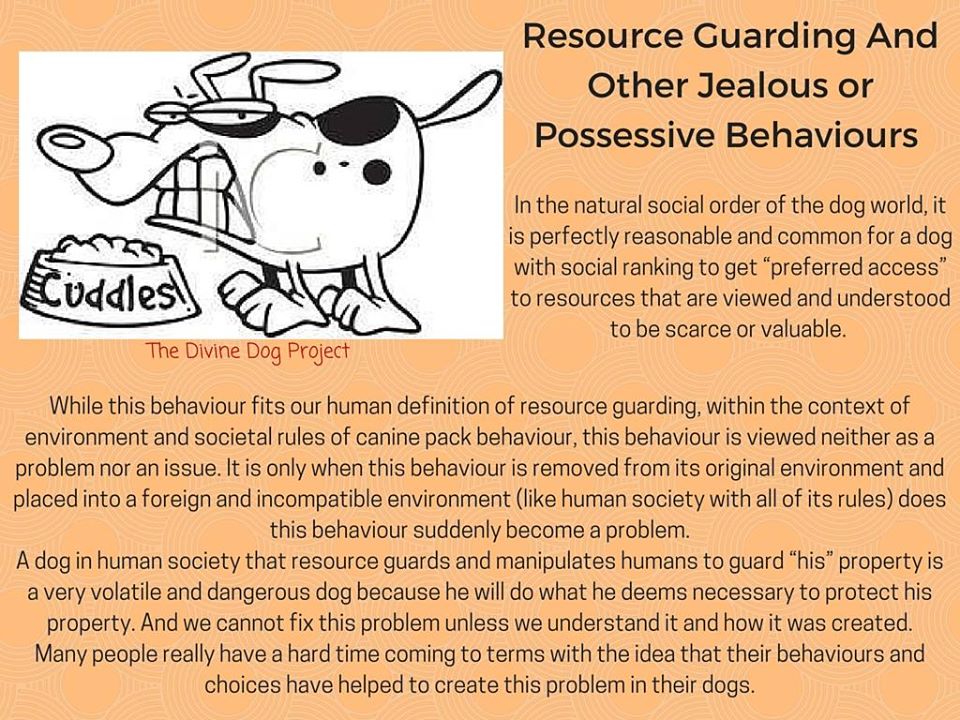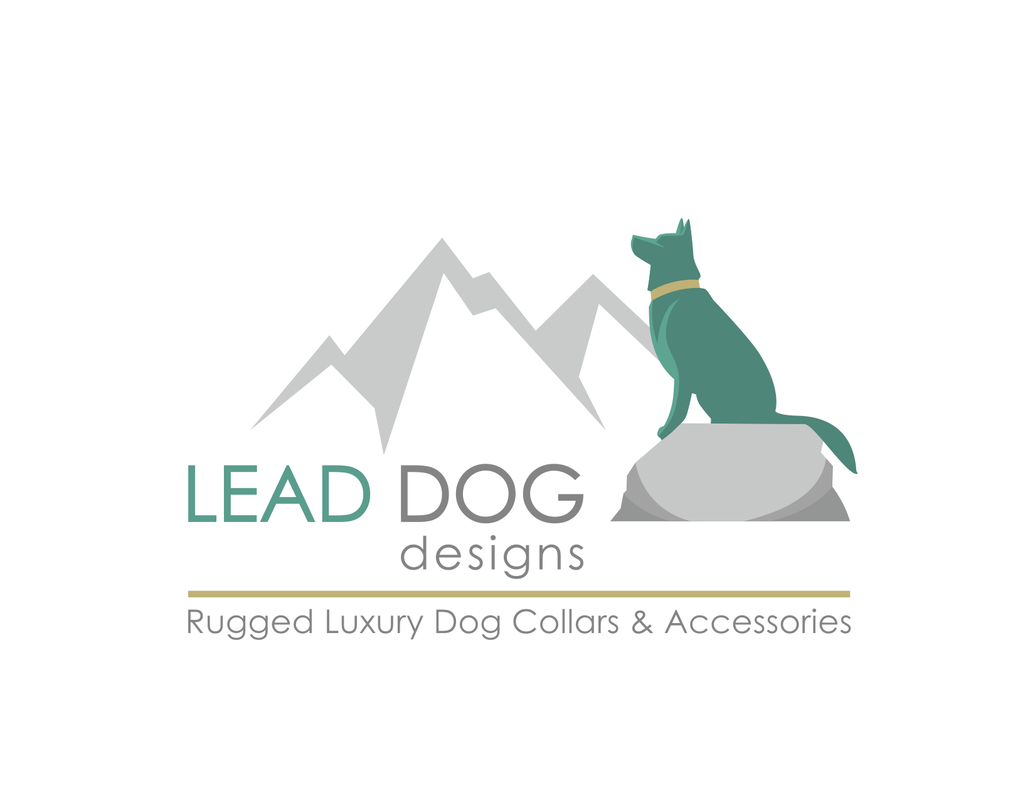LEAD DOG DESIGNS
|
Many people find themselves in a situation where their dog resource guards. It does not matter if a dog guards, a bone, a preferred sleeping spot, a doorway, or person. Dogs should never be allowed to "own" anything or anyone. Learn why this is a serious problem behaviour that must not be allowed to continue.
Jealous, Possessive, Resource Guarding Dogs; What's Happening Here? By Margit Maxwell I frequently get asked for help by owners of dogs because their dogs have turned their households into a war zone. These dogs lunge, snap, snarl at their owners when they don’t want to comply to a given cue They have become a menace in their community because they try to attack other dogs and people that approach them. They also have become very untrustworthy because they try to control the movements of family members (other family dogs included). These dogs have become little furry little dictators “barking” out the orders to everyone. Over confident dominant dictator dogs like to determine where they sleep, who comes and goes from the house, and they have even claimed ownership of all toys, food, and humans. Does this sound familiar? Has your dog turned into a jealous, over-protective tyrant who fiercely guards his possessions .... including YOU? Is this a problem? Yes, this is a very serious problem. Understanding How Dogs View Resources And Ownership Before we attempt to “fix” this problem it helps to understand the nature of the problem. In the natural social order of the dog world, it is perfectly reasonable and common for a dog with social ranking to get “preferred access” to resources that are viewed and understood to be scarce or valuable. While this behaviour fits our human definition of resource guarding, within the context of environment and societal rules of a canine pack, this behaviour is viewed neither as a problem nor an issue. It is only when this behaviour is removed from its original environment and placed into a foreign and incompatible environment (like human society with all of its rules) does this behaviour suddenly become a problem. Make no mistake, a dog in human society that resource guards and manipulates humans to guard “his” property is a very volatile and dangerous dog because he will do what he deems necessary to protect his property. But we humans have to understand that from a dog’s point of view, by resource guarding, he is not doing anything wrong or unnatural. Unfortunately, trying to convince a dog to stop a natural behaviour can be a long and challenging process. Stopping The Behaviour We cannot fix a problem unless we understand it and how it was created. Albert Einstein wisely pointed out that a problem could not be fixed on the same level where it was first created. So that means that in order to fix the dog’s behaviour issues, owners must first recognize and define the problem, understand how this situation came to be, what part they played in its creation, and how they continue to reinforce the behaviour. Then owners make a commitment to their dog and to themselves to think, believe, act, and choose differently. If they do not, they only serve to continue nurturing the very behaviours that created this problem in the first place. Sadly, many owners are in complete denial about how they could have possibly contributed to this problem. No one is really thrilled to hear that they created a mess (consciously or unconsciously) with their dog. While understanding why this is happened is important, it is equally important to focus on what you as an owner can do to fix this problem. Defining These Issues When it comes to these behavioural issues jealousy, resource of guarding, and over-protectiveness are not really interchangeable terms. The basis for their existence are related and rooted in commonality, but they are separate issues. There is a point where these separate issues do overlap and intersect with each other. At times this can make it difficult to know which behaviour issue you are actually dealing with. The Jealous Dog Can a dog be jealous? Yes it can. As it applies to dogs, jealousy can be defined as envy or coveting something or someone (“You have it and I want it” OR “You have it and I really don’t like that you have it.”). Dogs can be jealous of new people or other dogs entering into “their” territory, home, or family unit. They can be jealous and demand your undivided attention if they feel that they do not have it or no longer have it. Jealous dogs do feel like they should be the main of focus of your attention because most likely at some point they were initially the center of all of your attention. If you lavished and indulged your dog with disproportionate amounts of constant attention and then you stopped for some reason, your dog now resents this change. If you brought a new person or dog into the home that now also get your attention, then your dog may show jealousy. The basis for this behaviour is rooted in the dog’s belief system that goes along with this situation where he believes, or is lead to believe, that you are his property and no one else should have access to you. The Over Protective Dog Unless there is a truly real physical threat of danger, like a charging dog or an actual physical threat from a human, there is nothing in your environment that would require your dog to "protect" you. Generally, dogs that are believed to be over protective are actually displaying behaviours that are controlling, possessive, and jealous. What these dogs are actually doing is Resource Guarding you. When these dogs try and keep other dogs or people away from you, this is not done from feelings of great love or affection for you as much as it is done from feelings of guarding something they consider to be a valuable or scarce resource. In a nutshell, these dogs are sending a message to all interlopers to stay away from you because you are their PROPERTY and they “own” you. Their behaviour is shaped by the thought, “ I have this resource and I am afraid that you will take it away from me” or “ This is mine and I will not allow you take this resource away from me.”. The Resource Guarding Dog As already mentioned, in nature, it is perfectly natural and normal for a confident and dominant dog to take and keep possession of items regarded as having high value without there needing to be a fight over it. The attention and affection of a human is considered by dogs to be a valuable resource. While natural Resource Guarding may be considered to be a naturally occurring situation within wild dog packs, it is not something should be encouraged or allowed within the dynamics of the human society or within the human family unit as it tends to result in dog bites and dog fights. Sorry, This Is Not Love Sadly, many people really have a hard time coming to terms with the idea that their behaviours and choices have helped create this problem in their dogs. Countless people have made up epic stories of love, loyalty, and heroism displayed by their dogs as an explanation for their resource guarding behaviours. There are dogs who have genuinely protected their owners during situations of true great danger but the guarding behaviours commonly seen in most homes has nothing to do with the need to protect and owner from danger. There is no danger. The only danger that exists is in the mind of the dog who does not want to lose a possession. Worse yet, many people, while they admit that their dog’s “protective” behaviours causes them no end of problems, are still quick to reinforce the behaviours because they secretly are enamoured by or enjoy the idea of their dog protecting them out of a sense of great love or loyalty. Some people thrive on the feeling of the special attention they get from their dogs. Unfortunately, this kind of attention is not healthy or balanced and unless it is corrected and re-balanced, will end badly for you both you and your dog. These guarding and aggressive behaviours will not remain contained to isolated situations and will spread to other areas of your dog’s functioning. Your very protective dog will eventually end up trying to dictate all areas of your life and he will do it through growling, snapping, snarling, and biting at you. The reality is that dogs can respect you, be loyal toward you, and even “love you” without needing to keep everyone and everything away from you. Resource Guarding, Jealousy, and Possessiveness have nothing to do with affection. This is nothing more than an expression of being in an unbalanced relationship with your dog where he does not recognize or respect you in the leadership role you and he there has been no relationship bond forged between the two of you. Instead of being respected as a leader, you have been relegated to a lower position and allocated to be one of your dog’s possessions. Behavioural Signs That Your Dog May Be Possessive, Jealous, or Dominating With You It is important to be able to interpret the signs of these behavioural issues. Many people misinterpret them and miss the signs and as a result they do not realize the seriousness of their dog’s behaviours. Do you see your dog displaying these behaviours? Situational Aggression against: -Humans (children, partners or guests). -other family dogs or pets. - approaching dogs. Generalized aggression or guarding of: -food (resource guarding including empty bowls). -fear (fear causes him to automatically resort to aggression). -toys (resource guarding) -Furniture and sleeping places (resource guarding) -territorial aggression (guards yard, house, or crate against anyone entering HIS territory). The dog also: - is over protective, possessive, jealous or guards a particular human against other people or dogs. - has no respect or regard for other family members. -defies or rebels against cues issued by owners. -does not observe personal space of humans by repeatedly jumping on them, climbing on them, stepping on them, pushing against them, or leaning hard on them in an effort to control them or their movements. -uses their body, muzzle, or teeth on humans to move them, herd them, or control their movements. - steals food off human’s plate, hands, or off counters surfaces. -tries to control people and his immediate environment by excessive whining, growling, snarling, snapping or biting. -uses demanding, pushy, or obnoxious behaviours to get his way. -marks his territory outside and inside the house using urine or feces. -domination of humans and dogs by mounting them. It is true that all dogs can display one or two of these behaviours at one time or another especially while they are young and still learning. Also, recently adopted dogs may be totally lacking in training and may also initially display these behaviours. But if you continually see your dog displaying a number of these behaviours you may well be dealing with a jealous, over-protective, possessive, fear aggressive, guarding, over confident and dominating dog.
0 Comments
Leave a Reply. |
AuthorMargit Maxwell- A Dog Trainer (CPDT) and Canine Behaviour Specialist for The Divine Dog Project. She lives in Calgary, Alberta, Canada with her Herd of two Siberian Huskies (Kaya and Angel) and an Alaskan Malamute (Skylar). She also has credentials in Psychology (Human and dog), Animal Sciences, Natural Medicine, Energy Medicine, and many alternative Healing Modalities. Archives
February 2021
Categories
All
|
Shop |
Company |


 RSS Feed
RSS Feed
